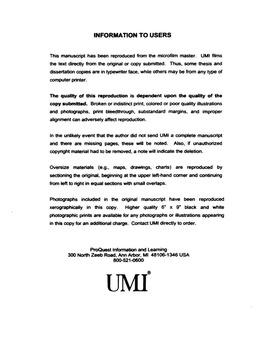| dc.contributor.advisor | Maiden, Jeffrey, | en_US |
| dc.contributor.author | Migliorino, Nicholas Joseph. | en_US |
| dc.date.accessioned | 2013-08-16T12:18:28Z | |
| dc.date.available | 2013-08-16T12:18:28Z | |
| dc.date.issued | 2002 | en_US |
| dc.identifier.uri | https://hdl.handle.net/11244/418 | |
| dc.description.abstract | This study focused on the secondary educator population of two school districts located in the southwestern region of the United States. The study developed and tested five research questions and hypotheses using the EATEGS survey. Of the educators surveyed a total of 720 completed surveys were returned. Using the quantitative methods of correlation analysis and multiple regression analysis the data were analyzed by individual districts and as an entire sample. | en_US |
| dc.description.abstract | The process of researching the relevant literature for this study was conducted by reviewing numerous sources of information. The sources reviewed include an analysis of Educational Resources Information Center (ERIC), books, articles, journals, websites, and dissertations. Literature directly addressing educators' attitudes towards the integration of electronic grading software into schools was found to be scant and virtually non-existent. Therefore, the literature obtained addresses with attitudes towards technology and/or computers. Based on the literature reviewed, it is apparent that years of computer experience, and years of teaching experience do have an impact on attitudes. It was also discovered in the literature that administrators' attitudes do impact teachers' attitudes. | en_US |
| dc.description.abstract | The purpose of this study was to determine if the attitude of educators towards the integration of electronic grading programs into their schools was significantly related to certain variables, including age, years of teaching experience, gender, relative years of computer experience, and the influence of administrators' attitudes on teachers' attitudes. The results might supply school districts with information to consider before, during, and while actively integrating electronic grading software into their district. | en_US |
| dc.description.abstract | The results obtained in this study appear to remain consistent with the trends set forth in the literature review. Years of computer experience and years of teaching experience were found to be statistically significant predictors of educators' attitudes. Interestingly, years of teaching experience and age (even though not statistically significant) both displayed a negative regression coefficient. The correlation analysis to determine if there was any significant relationship between teacher and administrator attitudes revealed that district 1 had no statistically significant correlation where district 2 and the entire sample did show a relatively strong correlation. The correlation analysis also reported a low variance accounted for with both variables which may suggest that there are other factors such as, but limited to past experiences, training, computer dependability or computer availability in existence which may affect educator attitudes. | en_US |
| dc.format.extent | x, 108 leaves ; | en_US |
| dc.subject | Education, Technology of. | en_US |
| dc.subject | Education, Administration. | en_US |
| dc.subject | Grading and marking (Students) Computer programs Public opinion. | en_US |
| dc.subject | Education, Secondary. | en_US |
| dc.subject | Public opinion United States. | en_US |
| dc.subject | Teachers United States Attitudes. | en_US |
| dc.title | Educators' attitudes toward the integration of electronic grading software into the classroom. | en_US |
| dc.type | Thesis | en_US |
| dc.thesis.degree | Ph.D. | en_US |
| dc.thesis.degreeDiscipline | Department of Educational Leadership and Policy Studies | en_US |
| dc.note | Source: Dissertation Abstracts International, Volume: 63-01, Section: A, page: 0152. | en_US |
| dc.note | Major Professor: Jeffrey Maiden. | en_US |
| ou.identifier | (UMI)AAI3038981 | en_US |
| ou.group | Jeannine Rainbolt College of Education::Department of Educational Leadership and Policy Studies | |
